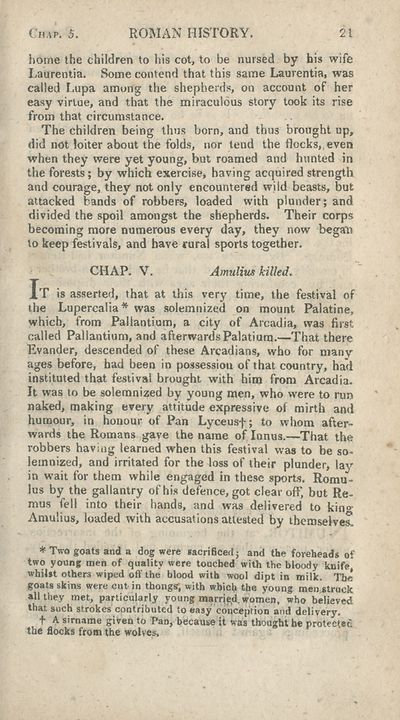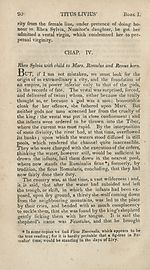Download files
Complete book:
Individual page:
Thumbnail gallery: Grid view | List view

Chap. 5.
ROMAN HISTORY.
21
home the children to his cot, to be nursed by his wife
Laurentia. Some contend that this same Laurentia, was
called Lupa among the shepherds, on account of her
easy virtue, and that the miraculous story took its rise
from that circumstance.
The children being thus born, and thus brought up,
did not loiter about the folds, nor tend the flocks, even
when they were yet young, but roamed and hunted in
the forests; by which exercise, having acquired strength
and courage, they not only encountered wild beasts, but
attacked bands of robbers, loaded with plunder; and
divided the spoil amongst the shepherds. Their corps
becoming more numerous every day, they now began
to keep festivals, and have rural sports together.
CHAP. V. Amulius killed.
It is asserted, that at this very time, the festival of
the Lupercalia* was solemnized on mount Palatine,
which, from Pallantium, a city of Arcadia, was first
called Pallantium, and afterwards Palatiura.—That there
Evander, descended of these Arcadians, who for many
ages before, had been in possession of that country, had
instituted that festival brought with him from Arcadia.
It was to be solemnized by young men, who were to run
naked, making every attitude expressive of mirth and
humour, in honour of Pan Lyceusf; to whom after¬
wards the Romans gave the name of Innus.—That the
robbers having learned when this festival was to be so¬
lemnized, and irritated for the loss of their plunder, lay
in wait for them while engaged in these sports. Romu¬
lus by the gallantry of his defence, got clear off, but Re¬
mus fell into their hands, and was delivered to kin<*
Amulius, loaded with accusations attested by themselves.
* Two goats and a dog were sacri6ced; and the foreheads of
two young men of quality were touched with the bloody knife
whilst others wiped oft the blood with wool dipt in milk. The
goats skins were cut in thongs’, with which the young men struck
all they met, particularly young married, women, who believed
that such strokes contributed to easy conception and delivery.
+ A sirname given to Pan, because it was thought he protected
the flocks from the wolves.
ROMAN HISTORY.
21
home the children to his cot, to be nursed by his wife
Laurentia. Some contend that this same Laurentia, was
called Lupa among the shepherds, on account of her
easy virtue, and that the miraculous story took its rise
from that circumstance.
The children being thus born, and thus brought up,
did not loiter about the folds, nor tend the flocks, even
when they were yet young, but roamed and hunted in
the forests; by which exercise, having acquired strength
and courage, they not only encountered wild beasts, but
attacked bands of robbers, loaded with plunder; and
divided the spoil amongst the shepherds. Their corps
becoming more numerous every day, they now began
to keep festivals, and have rural sports together.
CHAP. V. Amulius killed.
It is asserted, that at this very time, the festival of
the Lupercalia* was solemnized on mount Palatine,
which, from Pallantium, a city of Arcadia, was first
called Pallantium, and afterwards Palatiura.—That there
Evander, descended of these Arcadians, who for many
ages before, had been in possession of that country, had
instituted that festival brought with him from Arcadia.
It was to be solemnized by young men, who were to run
naked, making every attitude expressive of mirth and
humour, in honour of Pan Lyceusf; to whom after¬
wards the Romans gave the name of Innus.—That the
robbers having learned when this festival was to be so¬
lemnized, and irritated for the loss of their plunder, lay
in wait for them while engaged in these sports. Romu¬
lus by the gallantry of his defence, got clear off, but Re¬
mus fell into their hands, and was delivered to kin<*
Amulius, loaded with accusations attested by themselves.
* Two goats and a dog were sacri6ced; and the foreheads of
two young men of quality were touched with the bloody knife
whilst others wiped oft the blood with wool dipt in milk. The
goats skins were cut in thongs’, with which the young men struck
all they met, particularly young married, women, who believed
that such strokes contributed to easy conception and delivery.
+ A sirname given to Pan, because it was thought he protected
the flocks from the wolves.
Set display mode to:
![]() Universal Viewer |
Universal Viewer | ![]() Mirador |
Large image | Transcription
Mirador |
Large image | Transcription
| Antiquarian books of Scotland > Curiosities & wonders > Titus Livius' Roman history > (25) |
|---|
| Permanent URL | https://digital.nls.uk/115983449 |
|---|
| Description | Thousands of printed books from the Antiquarian Books of Scotland collection which dates from 1641 to the 1980s. The collection consists of 14,800 books which were published in Scotland or have a Scottish connection, e.g. through the author, printer or owner. Subjects covered include sport, education, diseases, adventure, occupations, Jacobites, politics and religion. Among the 29 languages represented are English, Gaelic, Italian, French, Russian and Swedish. |
|---|

